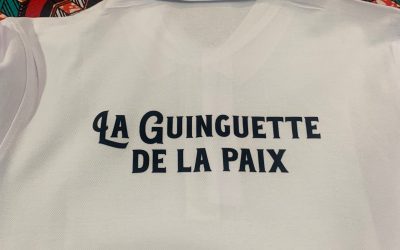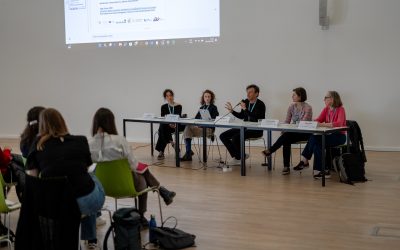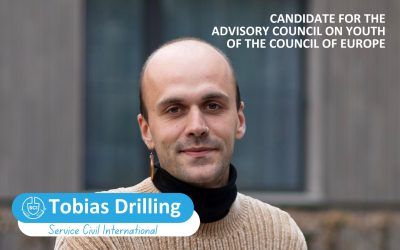International Volunteer Day (IVD) Webinar
by SCI-India Maharashtra State Group
December 5th is promoted worldwide by the United Nations Volunteer Programme (UNV) as the International Volunteer Day (IVD). SCI-India’s Maharashtra State Group celebrated the day with a virtual meet (webinar) on volunteering.
See the complete IVD Webinar here!
Thanks to all our active friends from various branches, groups and offices who joined the zoom meeting on short notice, there were 30+ participants including Maharashtra State Group members, newcomers as well as veterans. A big Thank You! to Nitin for inviting them all! His vigour and enthusiasm made this event happen. Special thanks to Vivek for making the booklet ‘Make Change Happen, Volunteer!’ (in three languages) ready in time, with contribution from Sunil. Thanks also to Shrikant for arranging the Zoom meeting and technical supervision. As the host, Vivek Patil opened the meeting at 1:00 pm local time (07:30 UTC). Sheherbanoo Gullar, the Group’s President, welcomed the participants. Vivek gave a brief account of Maharashtra State Group’s activities. The Group has recently been revived. Within a few days of holding the first post-revival Annual General Meeting (AGM) on 10th August 2022, the pace of volunteer activities accelerated impressively. These included :
- A short-term workcamp at a drug de-addiction centre near Mumbai, 13-16 August 2022
- SCI founder Pierre Ceresole’s Birth Anniversary celebration (17th August), with the publication of a booklet on Pierre and the history of SCI. The e-booklet was simultaneously published in eight Indian languages: Marathi, Hindi, Kannada, Urdu, Bengali, Tamil, Telugu, and English.
- International Day of Peace (21st September) celebration, with a host of activities that included a webinar (participated by local, national and international SCI volunteers); a poster exhibition on peace; children’s essay-writing, drawing and elocution event; a meditation session; Peace Oaths and a peace walk. These activities took place in various parts of Maharashtra, and as far as the neighbouring State of Goa. The highlight was a Peace Oath was that it was taken by students, women’s groups, and the webinar participants.
- Several week-end workcamps and workshops, and a 12-day workshop called ‘Women’s Empowerment Programme’
- A short-term work-cum-study camp at Panadur, a village in southern Maharashtra.
- A Get-together and The CWC (Central Working Committee of SCI-India) meeting was held near the workcamp site. The large number of group volunteers made it possible to hold these activities in different locations, sometimes on the same day. As Vivek pointed out, “people are always ready for doing voluntary work.”
In addition to the whole-hearted participation of the volunteers, without which these activities would not have been possible, a noteworthy aspect was that all these activities were financed by the volunteers through their own individual contributions. “Not a single rupee, none of the SCI funds, was used. This all came from the volunteers’ pockets,” Vivek said, and expressed his appreciation for the volunteering spirit and efforts of all volunteers, especially those from SCI-India and particularly the Maharashtra Group.
The next speaker, Nurul Syahida, former President of SCI-Malaysia, hoped that with the end of the pandemic, “we can go back to doing our regional workcamps and meetings, and visit each other.” A long-time SCI volunteer who has attended workcamps and regional meetings in India, Vietnam, Bangladesh, Indonesia, and Korea, she felt that every workcamp is very special, with its own regional theme. She suggested SCI branches in Asia update reports of their activities on social media and in SCI’s E-Zine, to help attract more volunteers from other regions. She noted that SCI-India was well known for accommodating many foreign volunteers, even having the international secretariat there [in the 1980s-1990s], which she hoped may happen again.
Next, AKMD Zahir Raihan, Board Member of SCI-Bangladesh, attempted to define voluntarism as “a form of helping in which people actively seek out opportunities to assist others, indeed make considerable and continuing commitments to provide assistance and sustain this … over an extended period of time … often at considerable personal cost.” Volunteering is good for volunteers, as it can bring joy and happiness while helping those in need, and add new, exciting experiences to one’s life. Volunteering saves resources; brings people together; promotes personal growth and self confidence; and strengthens local communities. It offers us a chance to give back to society. A volunteer should have passion, compassion, strong work ethic, teamwork spirit, time management skills, a positive attitude and willingness to help others”. Zahir regretted the loss of volunteers in the SCI family, not just in Asia, but worldwide, attributing it to individual limitations, global economic crises and the Covid Pandemic. For instance, the only volunteers at the Maharashtra Group’s recent Panadur workcamp that he participated in, were those from India and Bangladesh, and none from other regions or other Asian countries. He stressed that we have to encourage young people to volunteer, and ensure space for them in SCI. He was pleased to note that the Maharashtra Group accepted some college students who joined the workcamp activity as new members and decided to open a local unit there. Pledging his harmony with the UN goal of international solidarity through volunteering, Zahir asserted that this is not an era to stand alone, but stand together as one.
Dr. Shobha , ADC Chairperson, called volunteers “special people who come together to build a better world, and … a sustainable society.” Even a small act of helping someone cross the road, for example, is volunteering, and therefore, instead of looking for a big project or cause for volunteering, we simply need to join hands whenever a need arises, and build voluntarism in our own family, friends and those around us to help make a better community. “This is all possible only with togetherness; together we are stronger, together we are an unbreakable chain of goodwill.”
The next speaker, Mr. Munawir Borut, Coordinator for IVP-Indonesia, described the work of his SCI Group. When people ask what is volunteering, he answers that it’s not about money, but about making someone happy with your soul and your heart. The spirit of voluntarism is in team organisation and working together. IVP-Indonesia has held workcamps during times of crisis. An international workcamp was held in 2016, during the period of religious conflict between Christians and Muslims. Yet, the project work of planting trees involved the locals, especially children, and made everyone happy. IVP-Indonesia also publishes a magazine, now in the third edition, with articles on peace and children’s issues.
Tapas Sur, a veteran volunteer and Secretary of SCI-India’s West Bengal Group, gave a philosophical perspective of voluntarism. “It starts from within, and if it is allowed in its generic form, in a natural way, the sky is the limit, [and] it can promote us to that height.” The special advantage of volunteering is you attract good people, people with genuine hearts, and get inspired. We get a chance to develop ourselves and establish our identities in society. Voluntarism promotes us into a larger sphere of life, even internationally, and we can do things that otherwise we could not have done. It gives us the opportunity to view within. While we may doubt everything, the one thing that may not be doubted is the self, our own existence. “So, let’s start from there, and ask ourselves what voluntarism is, and how does it synchronise with my own personality.” If we want to grow, we have to focus on our integrity. “If there is a lack of integrity, then voluntarism does not work at all.”
The next speaker, Hemamali Perera, SCI’s Interim International President, drew participants’ attention to two points: the impact of voluntarism, and inclusiveness. In 2021, in spite of the restrictions caused by the Covid pandemic, SCI was still able to hold 105 workcamps, organise online events, exchange 519 volunteers, and place 146 long-term volunteers on various projects. In a normal year, SCI holds over 3000 workcamps worldwide in collaboration with its network of sister organisations. In 2016, more than 11,000 volunteers participated through international volunteer exchange. The International Secretariat is preparing a strategic plan for 2024-27 (the current plan is for 2020-23). It will focus on new approaches to improve the impact of volunteering. The International Secretariat always encourages SCI branches, groups, and workcamp coordinators and workcamp leaders to be inclusive. Inclusiveness applies to all categories of our society, such as people with special needs. It’s through inclusiveness that we can serve all people and practice what we preach.
Next, Wilbert Helsloot from the Netherlands was invited to speak. He pointed out that volunteering in SCI is special because we are volunteering for peace. We bring people together, do useful work for society, create bonds of friendship, and work for peace and mutual understanding. As a peace organization with a long history, and hopefully, a long future, there is a need to look far into the future. To that end, SCI is holding an international vision seminar. While our vision is still valid, we should look at adapting it to the changing world : the ‘new now’ after the Covid pandemic, an awareness of the global ecological crisis, and new forms of communication. Wilbert stressed that we are not alone. We can develop partnerships with other organisations to further our aim, to work for peace and beyond war. If we look outward, beyond our work in SCI, to other organisations working to make a better world, we can explore other ways to peace. The slogan of SCI is ‘working together, living together’, which we can practise not just within SCI, but also with other organisations.
At Dr. Shobha’s suggestion, Stephen Nah, from Malaysia, was welcomed to say a few words. Stephen, who has been with SCI for a long period, further elaborated the points made by the earlier speakers. Since SCI is a peace organisation, the best way to promote peace is from the peace within, which should show as a smile, reflecting the prayers and joy in one’s heart. “You cannot spread peace without having peace within,” he said. Whenever we have time to reflect or in group-study sessions, “we must … implore, explore, understand the peace within and be able to share.” The second point Stephen stressed was about engaging young people in SCI (remarkably, the youngest speaker was our International President herself). Senior people are important for the stability of the organisation, but young people often come and go. “Don’t expect them to be with us forever or permanently, but if we make volunteering fun, … they will come back, again and again.”
Vivek announced the release of the booklet, “Make Change Happen, Volunteer!’ to commemorate the day (IVD). He highlighted its main points, namely, why volunteering is important, reasons for volunteering, the rights of volunteers and expectations from them, notable points and reality check (what to expect and prepare for when volunteering). The booklet is expected to serve as a mini handbook for new peace volunteers. Zahir invited interested people to the APM and workcamp to be held in Bangladesh in June 2023. He and Tapas also came up with the idea of having a cross-border volunteer exchange with Nepal and Bangladesh, which share borders with West Bengal. Hemamali suggested sending a brief summary of the webinar with photos so that it can be published on the SCI website.
Rita Warleigh, Treasurer of IVP-Australia, joined at the last minute (misunderstanding about the meeting time). Rita, who has volunteered from a very young age, because her parents were volunteers (“it’s in the blood,”), believes that volunteering comes in many forms. What we get from volunteering is not just the feeling that we did something for the community, but “the engagement with the community, which is what we are all looking for … to make us feel whole.”
Tabassum, one of the Group’s new volunteers, made an interesting suggestion: the Group should hold a Q&A session so that experienced volunteers can share their experiences with the young people.
The meeting concluded with Sheherbanoo and Vivek expressing their thanks to all the Participants.
The following are the major takeaways from this inspiring meeting:
- Involve more young people.
- Join hands when a need arises, because together we are a stronger chain of goodwill.
- For voluntarism to work, the volunteer must have integrity.
- We don’t just volunteer. We volunteer for peace
- You cannot spread peace without having peace within.
- Explore more ways to peace by looking outward; others are also helping make a better world.
- Sky is the limit for our action.
The Maharashtra State Group’s other activities on this day included a women’s yoga session and cleaning a community playground for children.
[Report prepared by Sunil and Prabhakar, December 2022]
Explore more news
Shared solidarity meal at Guinguette de la Paix
On March 20th, SCI France gathered for the shared Solidarity Meal at Guinguette de la Paix - a well-established monthly event at SCI France, centered this time on sub saharan cuisine. It was a welcoming event in which it was shared a pleasant meal in the spirit of interculturality. It was also a chance to introduce our new volunteers Lauriane and Rosanna and share a bit about the role they’ll...
CEV Spring Volunteering Congress
The Centre for European Volunteering (CEV) Spring Volunteering Congress 2025 in Mechelen was a gathering of volunteering organisations from across Europe to talk about the future of volunteering. Participants shared ideas and experiences on how volunteering can support communities, promote inclusion, and develop skills. The event included visits to local projects, group discussions, and...
Tobias Drilling candidate for the Council of Europe’s Advisory Council on Youth!
SCI is proud to be nominating Tobias Drilling on the Council of Europe’s Advisory Council on Youth!




